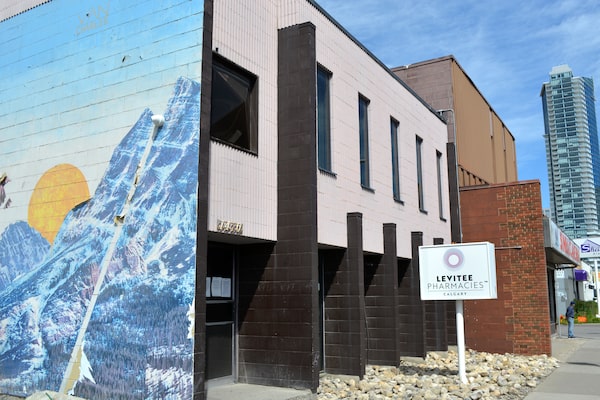
Levitee Labs acquired this addictions treatment clinic in Calgary last year, but it is now being closed.Alanna Smith/The Globe and Mail
Albertan addictions physicians are worried for clients with opioid use disorder in light of the abrupt closing of several private clinics that offer treatment in the province, including a Calgary location that is shutting its doors this week after one doctor’s unsuccessful attempt to keep it open.
Levitee Labs, a privately owned company based in British Columbia, acquired five addictions clinics in Alberta less than a year ago. In June, the company announced the closing of three clinics and associated pharmacies in Medicine Hat, Calgary and Grande Prairie. A physician who formerly worked with Levitee Labs took ownership of the Red Deer clinic in April. Only the Lethbridge location remains open.
The clinics offered addiction treatment, in which patients were prescribed methadone or suboxone under medical supervision to reduce withdrawals and cravings for opioids. The treatment has proven successful in preventing the use of street drugs, which are highly toxic and currently killing an average four people daily in Alberta – double the pre-pandemic rate.
Levitee and company officials did not respond to numerous requests for comment from The Globe and Mail.
The company website does not note any changes to its clinics and says Levitee is the “largest nongovernmental provider of addiction and chronic pain services in Alberta” with more than 30,000 patients.
Feds announce program to fight opioid poisoning in Edmonton
Alberta firefighters need more support to deal with increasing toll from opioid crisis, union says
Stuart Wilkinson, who served about 2,100 people at the Calgary clinic, said he was told that the company decided to close the sites because they weren’t making a profit. He said he pushed back against Levitee, buying a short amount of time to find a solution.
The doctor said he approached Alberta Health Services, the province-wide health authority, and the Alberta government for support in June. He said AHS told him last Friday that no funding or service agreement was possible through the province. The Calgary clinic is set to close on Friday.
“I’m sad. I tried really hard. It cost me six grand to try and keep it open,” Dr. Wilkinson said. “This shouldn’t be a private industry. It should be a government-run industry, because it’s for people. It’s not a business.”
The health ministry and associate ministry of mental health and addictions did not return repeated Globe requests for comment.
According to the College of Physicians and Surgeons of Alberta, physicians must give the college 90 days notice before closing or leaving a practice and must take “reasonable steps” to place patients under care with another provider. The college said in a statement that the standards do not apply to Levitee because the owner is not a physician.
While patients can undergo treatment elsewhere, Dr. Wilkinson said the location of Levitee in Calgary’s inner city Beltline community was ideal for many clients, and the closest alternative, about two kilometres east at the Sheldon M. Chumir Health Centre, can only take on so many new patients.
“This program gives them a chance. The main thing it does is it tells them they’re normal. They’re humans,” Dr. Wilkinson said. “I might be seeing a diabetic in the morning and I’ll treat that person who’s addicted to opiates exactly the same. It’s a medical illness and they need treatment for that medical illness.”
He added that he has been unable to get in touch with Levitee for weeks.
Levitee Labs paid $350,000 last year to purchase the clinics from ACT Medical Centres Inc., according to a company news release.
“With innovation and our patient-centric approach, we expect to make a meaningful impact and improve services to the Alberta communities where these clinics are located,” then-chief executive officer Pouya Farmand says in a release dated July 29, 2021. Mr. Farmand, who was replaced as CEO in February, did not respond to requests for comment.
Three executives listed on the company’s website told The Globe they resigned from their positions earlier this year because of new opportunities or because of changes in operations.
Six other executives and directors of the company did not respond to requests seeking comment. That includes current CEO David Bentil, whose appointment was announced in a June company news release, who did not return multiple calls and e-mails.
AHS spokesperson Kerry Williamson said in a statement that owners of the private for-profit clinic did not notify the agency of the closings or submit proposals related to operations. He said they are working with affected clients to “ensure they get the care and support they need.” AHS declined to comment on requests of support from Dr. Wilkinson, who is not the owner.
Mohammed Mosli, a former medical officer with Alberta Health Services, was named Levitee’s chief people officer last October and worked in their Red Deer clinic. Dr. Mosli said he resigned from the company in February over issues with the management of the business. He then took ownership over the Red Deer location in April, rebranding it as the Care Gateway Medical Clinic.
In Calgary, signs were taped on the outside of the Levitee clinic in June, saying the pharmacy was “closed effective immediately” and that patients could have their prescriptions transferred.
Monty Ghosh, an addictions physician who serves patients accessing opioid dependency treatment in public clinics, said a woman in Grande Prairie learned of her local Levitee clinic, and its pharmacy, closing after seeing similar signs. She was connected to Dr. Ghosh the day her suboxone prescription needed a refill.
For others, the timing might not be right: Dr. Ghosh said patients who go longer periods of time without treatment could return to street drug use where the risk of overdose is extraordinarily high. Members of this vulnerable community might also be unaware of where to access similar programs or uncomfortable going elsewhere having developed trusted relationships at their current clinic.
Dr. Ghosh said the problem with private clinics is that profit can sometimes come before people. He said a current lack of prescribers has increased reliance on private companies, and that the public sector must be expanded to prevent a similar situation from occurring again.
“There is profiteering off of the drug poisoning crisis,” he said. “It’s not done through a lens of compassion.”
We have a weekly Western Canada newsletter written by our B.C. and Alberta bureau chiefs, providing a comprehensive package of the news you need to know about the region and its place in the issues facing Canada. Sign up today.
 Alanna Smith
Alanna Smith